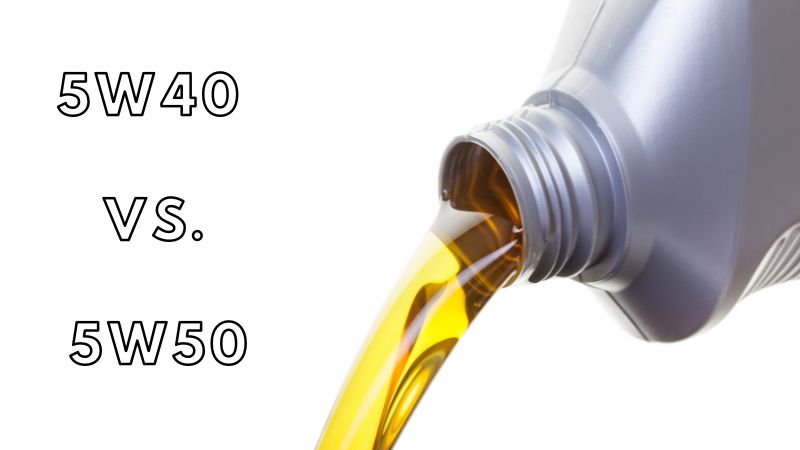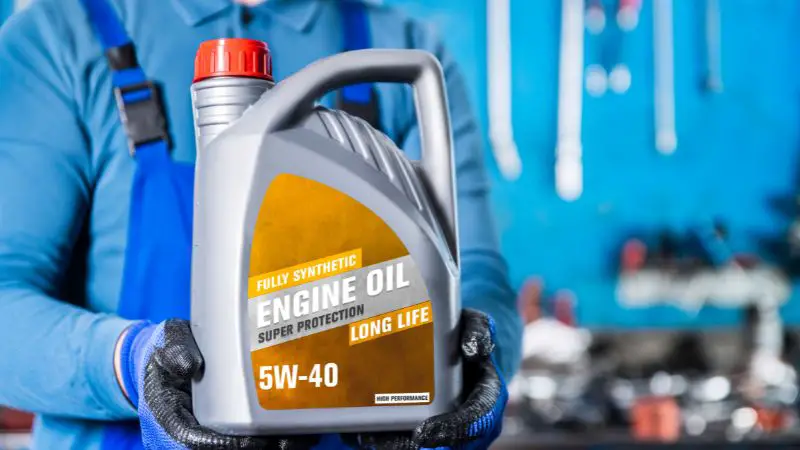Since 5w40 and 5w50 oil look similar in viscosity indexes, you may think both oils are the same and interchangeable. But they are not the same type of oil and are used in entirely different applications. Nevertheless, today we have discussed 5w40 vs. 5w50 oil in this article.
We hope it will help you to understand the differences between 5w40 and 5w50 and their applications in weather conditions. Keep reading to learn all the essential information to decide which engine oil is best.

5w40 And 5w50 Oil: Meaning Explained
For every oil grade, the number before the ‘W’ indicates the weight or viscosity of the oil at low temperatures. And the number after the ‘W’ indicates the thickness of the oil at higher temperatures.
The 5w50 or 5w40 oil number indicates the weight or thickness of the oil. The primary engine oil characteristic or lubricant is that the oil thickens when cold and thins when hot.
The number before the ‘W’ of the 5w50 viscosity helps the oil flow at cold temperatures. In contrast, the second number refers to thickening oil to prevent friction between motor moving parts. For both 5w50 and 5w40, the number before the ‘W’ indicates that both oils have the same low-temperature viscosity.
The critical difference lies in viscosity at high temperatures, which makes both perfect for different applications. 5w50 is extra thick, maintaining an extreme level of protection at operating temperatures than 5w40. Likewise, this unique feature makes it the perfect engine oil for sports cars and high-performance engines.
What Is 5w50 Oil Used For?
5w50 synthetic oil suits high-performance engines where traditional oils can’t do the job. This 5W50 synthetic oil is ideal for diesel and gasoline applications like supercharged and turbo-charged forced induction engines.
Hence, 5W50 engine oil suits various applications, including extreme driving conditions. For example, you can use this oil in motorsport, classic/collector cars, and towing at high operating temperatures.
What Is 5w40 Oil Used For?
5W40 viscosity is standard for performance engines in European vehicles with gas-powered machines and American diesel pickup trucks. Therefore, they also are the best oil for gasoline and diesel-powered engines.
Accordingly, 5w40 oil is ideal for starting engines at low temperatures and effective at high engine temperatures. Ergo, you can use 5w40 in most situations.

5w50 Vs. 5w40: What Are The Differences?
Let’s discuss 5w50 and 5w40 motor oils differentiate below:
Viscosity
The 5w40 engine oil for oil viscosity has five at 0°C. ‘W’ stands for winter, and 40 is the viscosity at 100°C. As mentioned earlier, their viscosity is the main difference between 5w40 and 5w50 engine oil.
Temperature Range
The main reason for introducing multigrade viscosity is temperature fluctuation. Generally, the oil becomes too thick if the temperature drops and does not flow perfectly through the engine.
When the temperature increases, the oil becomes too thin to lubricate the essential parts of the engine properly. According to the temperature range, multigrade viscosity does a great job. Viscosity improvers help the oil change its density with temperature. Thickness increases with increasing temperature and reduces with reducing temperature.
With 5w40, anyone can comfortably crank their engine, and the oil achieves fluidity even at -25 degrees Celsius. For high temperatures, the oil effectively and accurately lubricates the machine to an ambient temperature of 40°C.
Adequately, 5w50 contains a broad temperature range, making it useful for use in an extensive temperature range. So this 5w50 oil is ideal in places where temperatures are occasionally intense.
Fuel Economy
Choosing between 5w40 and 5w50 motor oil, 5w50, will be best, but it’s expensive. Yet, it contains a high viscosity index. That means its viscosity is little dependent on temperature.
Thus, 5w50 oil provides long-lasting performance. In addition, that means the motor will expand its mileage between engine oil changes.
As a result, it can protect your engine in extreme conditions. Mainly, 5w40 and 5w50 motor oil at low temperatures will have the same characteristics.
Price Difference
Generally, 5w50 is more costly than 5w40 for a broader range of viscosities. However, prices may vary from manufacturer to manufacturer because different brands make different quality oils.
Moreover, 5w50 is ideal for sports cars and high-performance vehicles because they need high protection. Therefore, 5W50 oil is generally priced higher than 5W40 for its ability to protect the engine over a high-temperature range.
Hot Weather
For people who buy a new car, it’s best to use 5w40 oil instead of traditional 10w30. But the vehicle location will affect it. Manufacturers usually prescribe a particular oil for use in high-temperature areas.
If you live in Canada, you should use special oil because of the freezing weather. This is because oil viscosity is directly proportional to oil mass.
In particular, 5w40 is a weighted oil designed to operate at low temperatures. As a result, it will go down smoothly. On the other hand, 5w40 oil is more suitable for hot weather.
Quick Comparison Table Between 5w40 Vs. 5w50:
| Properties | 5w40 | 5w50 |
| Kinematic viscosity at 40℃ (104 °F) | 82.2 mm2/s | 103.1 mm2/s |
| Kinematic viscosity at 100℃ (212 °F) | 13.5 mm2/s | 17.67 mm2/s |
| Flash point | 230℃ 446°F | 250℃ 482°F |
| Freezing point | -36℃ -32.8°F | -40℃ -40°F |
5w50 Vs. 5w40: Which Engine Oil Is Better?
5w40 vs. 5w50, which is better, only depends on using the vehicle. For typical or regular uses, the 5w40 will be perfect, but for sport driving, the 5w50 is better. Remember that you should always depend on your engine manufacturer’s recommendation. Rising the viscosity is risky; before choosing the oil, consider all the nuances.
When you know why you should enhance the viscosity, you won’t question “which oil is better.” So learn the risks before deciding on this. Your best motor oil would be the oil your car manufacturer recommends.
What Oil Can I Use Instead Of 5w50?
In ambient temperatures, 5w50 and 5w40 will offer similar results. In hot situations like summer, the 5w50 oil will be better than another. But in hot summer you can use 20w50 engine oil instead of 5w50. The reason is that they will perform the same.

FAQ (Frequently Asked Questions):
Q. Can you use 5w30 or 5w20 instead of 5w50?
A specific oil depends somewhat on the ambient temperature or climate and how hot the engine gets when working hard. So you can use 5w30 instead of 5w50, but 5w20 isn’t suitable.
Q. Is 5W-50 suitable for summer?
Though w in 5w50 stands for winter, this oil was tested to flow with motor temperatures in the summer. So most engines will never operate up to 450°F.
A fully synthetic 5w50 oil will be fine in summer weather. Generally, it will work well in summer. Maybe not if you’re on the track all day, but we need to know any reasonable alternatives.
Q. What vehicles use 5W50 oil?
5w50 engine oil provides better performance in a performance engine in high-temperature climates. Moreover, the 5.4L supercharged Ford applications such as the Ford GT, Shelby GT 500, and Focus RS use 5w50 oil. Using 5w50 oil is best in 2001-2002; Range Rover engines also are recommended for API SN/SL/SJ/SH/SG/CF and ACEA A3/B3/B4.
Q. What is the temperature range for 5W50 oil?
5W means the oil is ideal for winter temperatures below -35 °C. The second part of the SAE class indicates the kinematic viscosity at 100°C. Notably, the 5W50 has a flowability of 16.3 to 21.8 mm²/s at 100 °C temperature and can tolerate maximum loads.
Final Thought
Finally, don’t blindly follow the advice of the web when deciding whether to put 5W40 vs. 5W50. Before choosing any engine oil, track your vehicle handbook; the owner’s manual is better. That manual gives you two crucial information pieces: viscosity and manufacturers’ specification requirements. Ultimately, we hope this information will help you to find the best one for your engine. Thanks for reading this blog with patience.
Check:
